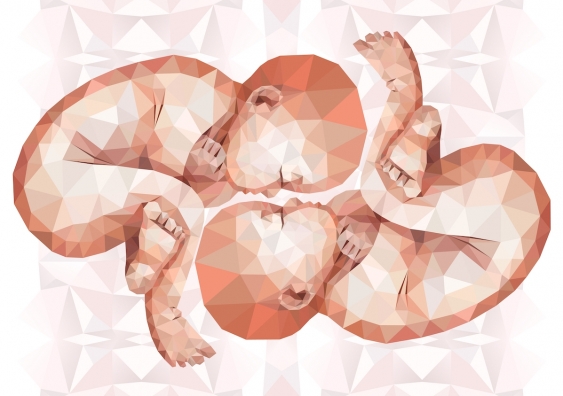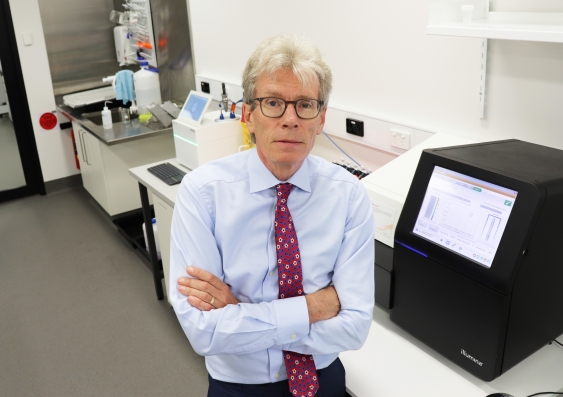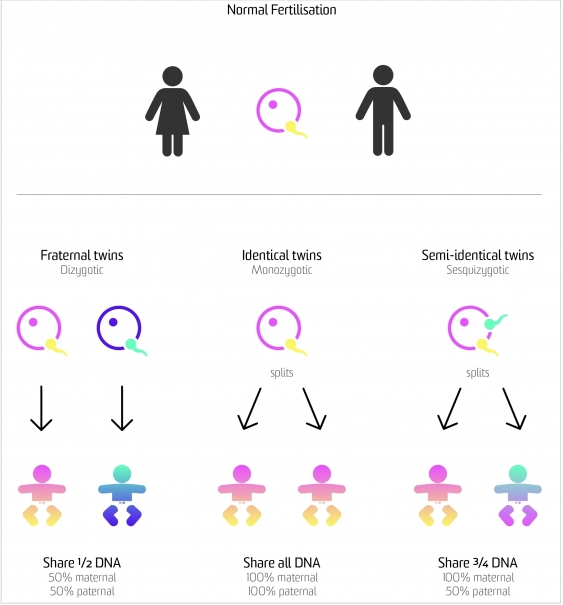Semi-identical twins identified in pregnancy for first time
In a world first, researchers from UNSW Sydney and QUT have used genetic testing to detect semi-identical twins during pregnancy.
In a world first, researchers from UNSW Sydney and QUT have used genetic testing to detect semi-identical twins during pregnancy.

Lucy Carroll
UNSW External Communications
9385 8732, 0402 005 319
l.carroll@unsw.edu.au
Young Queensland twins, a boy and a girl, have been identified as only the second set of semi-identical twins in the world – and the first to be identified by doctors during pregnancy.
The twins, who are identical on their mother's side but share only part of their father's DNA, are the first case of semi-identical, or sesquizygotic, twins identified in Australia. They are the first worldwide to be diagnosed by genetic testing while still in the womb.
Fetal medicine specialist and Deputy Vice-Chancellor (Research) at UNSW, Professor Nicholas Fisk, and QUT clinical geneticist and Diagnostics Genomics course coordinator Dr Michael Gabbett, identified the twins in the paper ‘Molecular Support for Heterogonesis Resulting in Sesquizygotic Twinning’, published today in The New England Journal of Medicine.
The now four-year-old boy and girl twins share 100% of their mother’s genes, but are like siblings on their father’s side, sharing a proportion of their father’s DNA.

Professor Nicholas Fisk led the fetal medicine team that cared for the mother and twins in 2014. Photo: Rose Drover
“It is likely the mother’s egg was fertilised simultaneously by two of the father’s sperm before dividing,” said Professor Fisk, who led the fetal medicine team that cared for the mother and twins while based at Royal Brisbane and Women’s Hospital in 2014. Professor Fisk, a past President of the International Fetal Medicine and Surgery Society, worked alongside clinical geneticist Dr Gabbett.
“The mother’s ultrasound at six weeks showed a single placenta and positioning of amniotic sacs that indicated she was expecting identical twins. However, an ultrasound at 14 weeks showed the twins were male and female, which is not possible for identical twins.”
Identical twins result when cells from a single egg fertilised by a single sperm divide into two, so identical twins are the same gender and share identical DNA. Fraternal twins occur when each twin develops from a separate egg and the egg is fertilized by its own sperm.
If one egg is fertilised by two sperm it results in three sets of chromosomes, one from the mother and two from the father, said Dr Gabbett. Three sets of chromosomes are typically incompatible with life and embryos do not usually survive.

Sesquizygotic represents a third type of ‘twinning’ between identical and fraternal.
“In the case of the Queensland sesquizygotic twins, the fertilised egg appears to have equally divided up the three sets of chromosomes into groups of cells which then split into two, creating the twins,” said Dr Gabbett.
“Some of the cells contain the chromosomes from the first sperm while the remaining cells contain chromosomes from the second sperm, resulting in the twins sharing only a proportion rather than 100% of the same paternal DNA.”
Sesquizygotic twins were first reported in the US in 2007. The twins only came to doctors’ attention in infancy after one was identified with ambiguous genitalia. On investigation of mixed chromosomes, doctors found the boy and girl were identical on their mother’s side but shared around half of their paternal DNA.
Professor Fisk said an analysis of worldwide twin databases pointed to just how rare sesquizygotic twins are.
“We at first questioned whether there were perhaps other cases which had been wrongly classified or not reported, so examined genetic data from 968 fraternal twins and their parents,” he said.
“However, we found no other sesquizygotic twins in these data, nor any case of semi-identical twins in large global twin studies.”
At age four, the twins are healthy and have achieved all their development milestones.
“We know this is an exceptional case of intermediate twins, also known as a third type of twinning,” said Professor Fisk. “While doctors may keep in mind that these types of twins are extremely uncommon, its rarity means there is no case for routine genetic testing.”